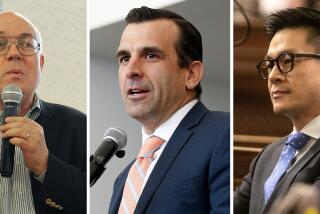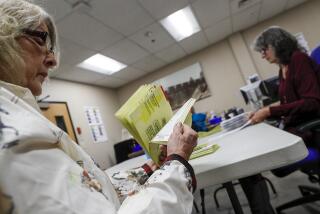U.S. Review Is Unlikely to Delay Recall Election
- Share via
The federal government probably has enough time to review election changes for the Oct. 7 recall without causing the vote to be delayed, but some of the changes may have trouble winning approval, experts in voting law said Monday.
Justice Department officials said Monday that they had approved the date of the election but that other issues remained under consideration.
In particular, plans to consolidate polling places in Monterey County could trouble Justice Department attorneys, who have delayed elections for changes in procedures that they felt were discriminatory.
Monterey County is one of four counties in the state in which changes in election practices must be approved by the federal government. This approval, called pre-clearance, is mandated by the Voting Rights Act of 1965 in states and counties with a history of low turnout and racial and ethnic discrimination.
A federal judge has given Monterey County until Aug. 29 to win pre-clearance and has stopped the county from mailing out absentee ballots overseas in the meantime. If Monterey fails to get pre-clearance, the entire statewide recall may have to be postponed.
“This is obviously high visibility with significant time pressure and it is coming at a time when the Justice Department is probably not overwhelmed,” said Richard H. Pildes, a law professor at New York University School of Law and an expert on the Voting Rights Act. “It is possible, if it gets expedited treatment, that the Justice Department could resolve it in a couple of weeks.”
A spokesman for the Justice Department said the amount of time a review takes depends on the nature of the election change. The department is giving the California requests an expedited review.
“Some can take a week or a couple of weeks and others can take a full 60 days,” said Jorge Martinez, the spokesman.
For example, the Justice Department approved the Oct. 7 recall date Monday but is taking more time to study changes in polling places. Monterey’s application for approval of specific election changes reached the Justice Department on Friday.
Martinez said Monday that the department has not received any requests from California’s three other counties that need pre-clearance for election changes -- Kings, Merced and Yuba.
Among the revisions Monterey must have cleared is a plan to reduce the number of polling places from 190 to 86. Voting officials in many counties have reduced the number of polling places for the recall, saying that is the only way to organize an election on short notice. Experts said this request could run into trouble.
“I think the state would have a serious burden of showing that that did not make minorities worse off,” said Laughlin McDonald, head of the American Civil Liberties Union’s Voting Rights Project. “I am sure there have been objections [by the Justice Department] based on the consolidation of precincts. It sounds problematic.”
Joaquin G. Avila, who has worked on cases involving the Voting Rights Act for nearly 30 years, agreed. He is a lawyer in one of the suits that could postpone the recall because of a lack of pre-clearance.
“I’d be very surprised if they pre-cleared a condition that resulted in cutting polling places” that much, Avila said. “That is unprecedented.”
The Justice Department received nearly 12,000 submissions for pre-clearance in the first two years of the Bush administration. Most were small changes and were approved without a hitch. But from time to time, the department’s refusal to approve the plans causes elections to be delayed.
The Justice Department has a staff of 20 to 25 lawyers who review proposed election changes, including redistricting. “Because they do so many of these on a yearly basis, they have worked out red flags of what they are looking for,” Pildes said.
In June, the Justice Department objected to a plan by Cherokee County, S.C., to reduce the number of school board members on the grounds that it would cut the number of districts in which African Americans constituted a majority of the population.
Many of the election changes reviewed by the Justice Department involve single precincts. Officials raised concerns in a 1999 case about election officials in McComb, Miss., who were using an American Legion post as a voting place. The concern stemmed from the fact that minority voters had to cross a railroad track to get to the site and didn’t have transportation available.
The suits that led U.S. District Court Judge Jeremy Fogel to postpone absentee voting in Monterey on Friday were brought by the Lawyers’ Committee for Civil Rights and the Mexican American Legal Defense and Educational Fund.
Lawyers in both suits have won victories in the U.S. Supreme Court in previous challenges of election changes in Monterey County. In 1996, in a case out of Monterey, the high court ruled that elections must be blocked if they involve voting changes that have not won pre-clearance.
Robert Rubin, legal director of the Lawyers’ Committee, said his group will present the Justice Department with evidence in the next few days showing that the changes in Monterey County could hurt minority voters.
More to Read
Sign up for Essential California
The most important California stories and recommendations in your inbox every morning.
You may occasionally receive promotional content from the Los Angeles Times.














